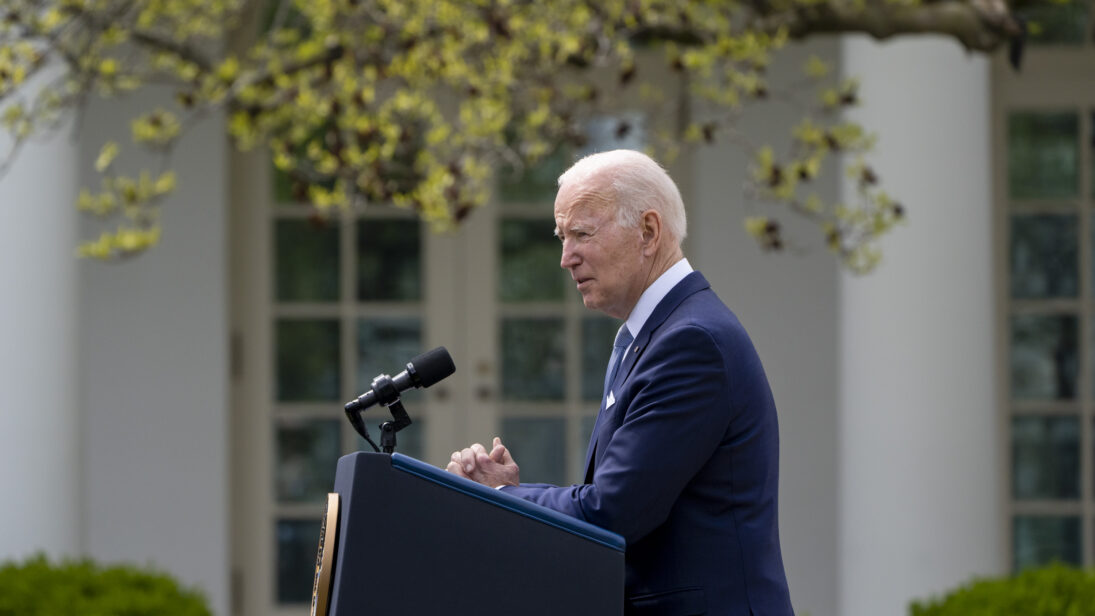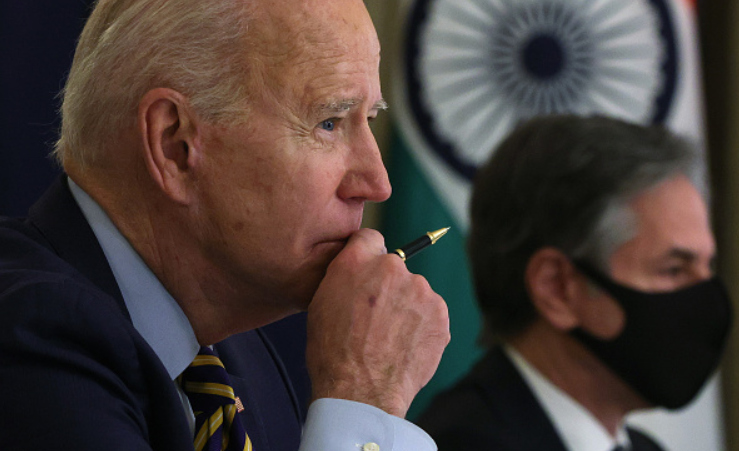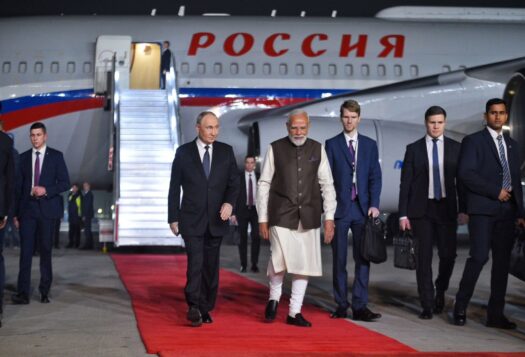
The war in Ukraine has underscored the dangers of Russian authoritarianism and the destabilizing potential of totalizing nationalist ideologies. Vladimir Putin’s Russia employs propaganda domestically to justify the invasion, radicalize Russians against the West, distort historical narratives, and prime citizens for war. U.S. policymakers have rightly attributed the invasion of Ukraine to Russian authoritarianism and refocused U.S. attention on Europe. But the United States has too easily fit its anti-Russia strategy within the structural framework of military-based great-power competition, its preferred lens for approaching the global rise of China.
Since February, U.S. statements on Russia and China have carried a similar message: the United States is prepared to counter both states militarily, to defend Taiwan from a Chinese attack and weaken the Russian state. Adopting a great-power competition approach against Russia and China neglects the more pernicious and increasingly global ideological threat both states pose to international stability.
Adopting a great-power competition approach against Russia and China neglects the more pernicious and increasingly global ideological threat both states pose to international stability.
As a consequence of this neglect, the United States, in the name of its anti-China strategy, has embraced other states in democratic backslide and refused to see their authoritarian and far-right ideologies as posing a mutually reinforcing transnational security threat. As it develops its anti-Russia strategy, the United States should refocus its foreign policy to consider China and Russia’s leaders in the global rise of authoritarian nationalism, rather than simply adversaries in a struggle for global power. As part of this strategy, the United States must commit to countering authoritarian and ethnonationalist threats within allied and partner states.
Authoritarian states are uniquely concerning because they can wage destabilizing, ideologically motivated wars with limited domestic constraints. Without institutional checks and balances, state actions are driven by the interests of autocrats, ruling parties, and nationalist ideologies. U.S.-allied states in democratic decline may follow models set by established autocracies like Russia in pursuing their own expansionist policies.
Russian decision-making during the Ukraine war reveals the consequences of democratic backsliding taken to the extreme. Decades of democratic decline and consolidated right-wing nationalism eroded checks and balances within Russian institutions and centralized power in the hands of Putin. Little real intelligence has reached Putin, misinforming him about the likelihood of success in Ukraine and eliminating any internal opposition that might have discouraged the invasion. Similarly, as the war has reached a stalemate and cost upwards of 15,000 Russian lives in the first two months of conflict, total state control of domestic media and information flow has prevented an anti-war movement from meaningfully constraining Putin’s actions.
The erosion of democracy in U.S. allies and partners could follow a similar path, leading states to pursue escalatory foreign policies and become less reliable partners. Framed as a “values-based” partnership to counter China, the U.S. relationship with India illustrates both of these repercussions. India has experienced a precipitous democratic decline under the rule of Prime Minister Narendra Modi, leader of the right-wing Bharatiya Janata Party (BJP). But while courting Indian participation in its Indo-Pacific strategy, the United States has largely ignored India’s attacks on press freedoms, targeting of religious minorities, record of state-sponsored violence, and inflammatory foreign policies.
Democratic decline intertwined with religious nationalism has led India to adopt escalatory and expansionist policies. India’s nationalist propaganda justified escalation against Pakistan in 2019 and inflamed tensions with China during the 2020 Ladakh border clashes. Leading Hindu nationalists have even called for an “unbroken India” that stretches from Afghanistan to Myanmar, a dangerous ideology that would breed regional instability. While U.S. policymakers envision India playing a balancing role in the Indo-Pacific, New Delhi’s domestic ideological project mires it in disruptive territorial disputes, border skirmishes, and internal turmoil.
Without real commitments to countering democratic erosion, the liberal packaging of the ‘Free and Open Indo-Pacific’ strategy is only a diplomatic cushion for militarily focused great-power competition.
Despite increased defense cooperation, India also has yet to prove itself as a reliable partner of the United States. India maintains a deep and long-standing defense relationship with Russia and is increasingly casting its domestic politics in China’s mold. In recent months, India has refused to condemn the invasion of Ukraine, while pro-government news outlets have flooded the public information space with anti-U.S. rhetoric and bristled at criticisms of India’s relationship with Russia.

If the United States ignores India’s authoritarian slide, U.S. strategy will fail to target Russia’s and China’s resonance across the world. Without real commitments to countering democratic erosion, the liberal packaging of the “Free and Open Indo-Pacific” strategy is only a diplomatic cushion for militarily focused great-power competition. Unlike heavy arms, authoritarian ideologies slip undetected across borders and nationalist lines. Russia and China are examples for authoritarian movements around the world.
Addressing the reach and appeal of authoritarian nationalist ideologies will require identifying threats within allied states and holding defense partnerships to a higher standard of democratic strength. The developing U.S.-India relationship and the U.S.-Europe security bloc—partnerships framed around shared liberal democratic values—serve as important test cases.
The United States must better understand India’s democratic backsliding to address the roots of mutual distrust and long-term uncertainty in the U.S.-India partnership. Policymakers hail the relationship as a liberal democratic answer to China, but as long as democracy erodes in India, the partnership will have difficulty resolving the CAATSA sanction issue, initiating meaningful technology sharing beyond the Defense Technology and Trade Initiative, and developing a shared message on the Ukraine crisis.
The United States should establish an internal set of democratic metrics India must meet to qualify for a CAATSA waiver (for its purchase of Russian missile systems) and receive or co-produce significant U.S. defense technology. The pro-democracy non-profit Freedom House, which demoted India from “free” to “partially free” in March 2021, provides model indices for measuring India’s declining civil liberties, attacks on religious minorities, and threats to electoral integrity. India is unlikely to reverse course on majoritarian politics at the United States’ behest: it is uniquely prickly about any perceived foreign interference. But the United States can uphold the rights of U.S. citizens, companies, and publications to conduct independent research on India without intimidation. In its initial stages, the United States must call out religious nationalism in diplomatic meetings and monitor pro-Russia leanings in government and in the public. A concrete realignment of values and expectations would make India a more stable regional actor and stronger partner in U.S. strategy.
U.S. strategic thinkers should also examine the transnational appeal of parties with nationalist, authoritarian-leaning platforms in Europe and in the United States. Hungary’s accelerating democratic decline warrants special attention given its European Union and NATO membership and proximity to Russia. Hungary, led by far-right nationalist Viktor Orbán, split from other EU members in refusing to back sanctions against Russia. He later echoed Putin’s rhetoric in declaring that parts of the Adriatic coast had been “taken from Hungary.” Popular right-wing parties in France, Germany, the United Kingdom, and the United States—countries with strong institutional checks and balances—also praised Putin’s leadership, endorsed pro-Russia stances. Extremist and domestic terrorist groups have gone a step further in seeking out Chinese and Russian internet servers for banned social media websites.
If U.S. partnerships with India, NATO, and the EU are built on shared values, then parties must uphold them – both for sake of the values in and of themselves and for long-term cohesion.
The United States should cooperate with its European allies to target the spread of these ideologies as a national security threat. U.S. defense and national security apparatuses can employ the same tools they use to monitor China’s malicious cyber activity domestically. This includes investigating the role alt-right social media spaces play in enabling Chinese and Russian cyber incursions. The EU has stronger structures in place to combat disinformation and is set to involve NATO in rapid alert systems for better interoperability. By aligning its deterrence strategy with pre-existing systems for targeting disinformation, the United States will directly target anti-democratic forces domestically and in its partner states.
If U.S. partnerships with India, NATO, and the EU are built on shared values, then parties must uphold them – both for sake of the values in and of themselves and for long-term cohesion. Strategic partnerships measured on a stable foundation of shared democracy, rather than solely on aggregate defense capabilities, will prove stronger when these partnerships are tested.
Editor’s Note: This article has been cross-published from E-International Relations under their Creative Commons guidelines.
***
Click here to read this article in Urdu.
Image 1: The White House via Flickr
Image 2: Alex Wong via Getty Images


